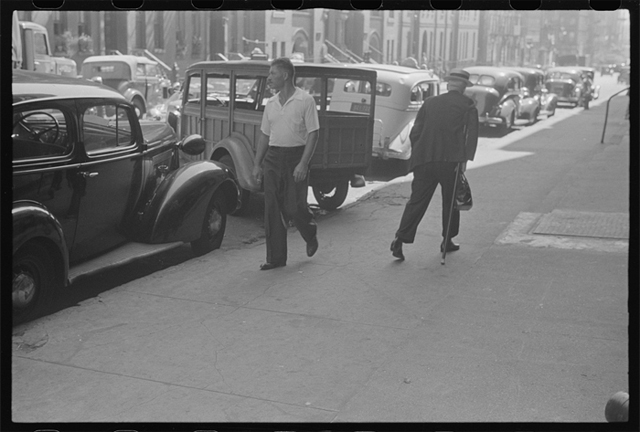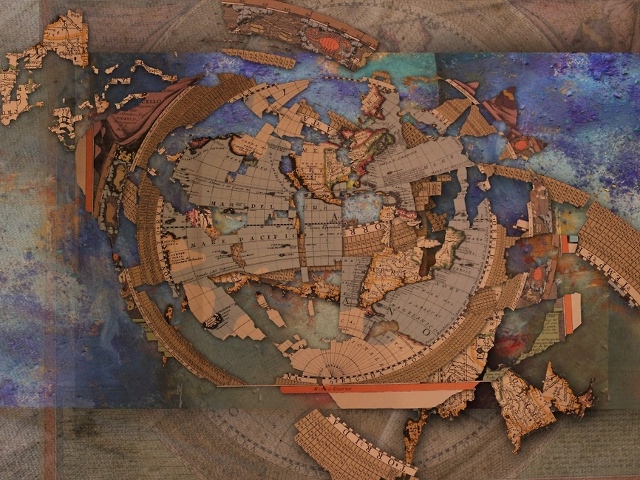“Nut was hungry. Nut had to move.” Originally self-published in 1935, this hallucinatory, quasi-experimental novel follows the peripatetic musings of a young man throughout a single day in Depression-era New York.

March 15, 2013
From his early days protesting against foot-binding to his short political career working for Sun Yat-sen to his later days advocating for economic justice, H. T. Tsiang aimed to use words to move people to action, paper bullets to change the direction of the wind. With The Hanging on Union Square, Tsiang put his oar into the conversation about what was wrong with the world during the 1930s. He wanted to transcend his identity as a “young Chinese poet” and become a major troublemaker, an idiosyncratic, hybrid version of Hamlet, Odysseus, Christ, and his own fictional creation, Mr. Nut. And he sought to achieve this purpose by imaginatively—and perhaps indiscriminately—borrowing techniques from a dizzying variety of genres. In so doing, Tsiang may have been following the principle of nalai zhuyi, or strategic appropriation from other writers, formulated by the influential Chinese author and literary theorist, Lu Xun. Lu argued that globalism and modernism compelled writers to abandon notions of generic purity; he thus encouraged writers to accomplish their artistic—and sometimes political—ends by freely appropriating from a variety of sources. Even Lu, however, may not have been able to predict the creative and disorienting ways that The Hanging on Union Square combines these forms. Small wonder then that every publisher Tsiang initially approached declined to take on The Hanging on Union Square. Putnam’s Sons, Minton, Balch, and Company could not imagine that the book would sell well enough to make “publication remunerative.” Little, Brown, and Company and Coward-McCann agreed. Covici-Friede suggested that he “re-write the story in straight-forward terms as a realistic novel.” Of course, H. T. Tsiang did not aim for remuneration or realism. Thanks to his own initiative, a few people read his book during his lifetime. Thanks to Kaya Press, the Trouble Maker’s masterwork is available again today.
— from the afterword by Floyd Cheung, editor of The Hanging on Union Square
XII: BEFORE THE ARRIVAL OF AN AMBULANCE
“HEAVEN IS ABOVE,
HELL BELOW,
NOTHING IN POCKET,
WHERE TO GO?”
It was Mr. Nut poetizing.
One o’clock.
At the corner of Fourteenth Street and First Avenue, Mr. Nut saw a garbage-can standing in front of another cafeteria.
He stopped.
He looked in.
He put his right hand in.
To see if there was anything inside.
An old man came running towards him. He yelled: “Get away from here! This is my station. I’ve got a sick wife to feed. You’re a young fellow: why don’t you go to the Relief Building? You have the strength. They have to feed you! They are afraid that you will make trouble.”
The old man covered the garbage-can with his whole body to keep it from Mr. Nut. Picking! Eating! And murmuring!
Nut moved to the other side of the can.
“Don’t touch this can!” continued the old man. “This is my station!”
“What do you mean,” asked Nut, “your station?”
“You heard me! Can’t you understand English? I have been living by this can for three months now.”
Nut moved back a few steps. Still looking on.
The snow whitened the pavement.
And the melting snow washed away all the dirt from the old man’s bony hands. They were as pale and bloodless as wax.
While the old man kept on digging, a tin box of Drainpipe Solvent appeared, alongside of a piece of rotten apple-pie. The old man picked up the pie with joy, and was ready to swallow it.
Nut dashed forward and grabbed the old man’s hand. He dropped the pie on the ground.
“You bastard! You take the food from an old man’s mouth! You damned hero!”
“Now look here. This pie, with that white powder on, is poison! It can put your stomach and lungs out of commission. It will kill you!”
“Is that so?” said the disappointed old man. “Now you, young fellow, you have spoiled my opportunity. I’m sick. I’m tired. I’m a coward and can’t kill myself. I’ve prayed that some day I will die just in the way you tell me, and so get rid of my misery. Now you have delayed my voyage to Heaven.”
Nut was hungry.
Nut had to move.
He went back to Third Avenue and from Fourteenth Street he followed the Third Avenue Elevated towards downtown.
He reached Thirteenth Street.
A half-drunk and half-awake bum approached him and asked for a cigarette.
“Who the hell wants to work?” the fellow began talking. “I ain’t no sap. It’s snowing so I’ll have good business tomorrow. I’ll make lots of nickels and pennies! Who wants to work? The big shots do nothing but enjoy everything. They drink champagne, I drink wood alcohol! Poison. They are yachting! Me? Around Third Avenue! Tell me, ain’t that justice? For heaven’s sake, give me a cigarette!”
Nut had no cigarette to give.
He walked from Twelfth Street to Eleventh.
A middle-aged fellow with a Southern accent approached Nut and asked him if he could spare a penny so that he would have thirty-five cents with which to go to a cheap hotel on the Bowery. He was a farmer. He had come from the South to this city and tried to find a job here. And he hadn’t slept for two nights. He already had thirty-four cents.
Nut had no penny to spare.
Nut walked on from Eleventh Street to Tenth Street.
Another fellow came to him and asked him if he had a match.
Mr. Nut stopped. Searched.
In addition to a match, which Nut gave to the fellow, he felt something small, round and solid in the corner of his vestpocket.
Before using his eyes to see it, Nut prayed: “Let it not be a button. I have lots of buttons. Let it be a dime.”
If it were a dime, Nut would be able to have a bowl of soup together with a piece of butter, and two Big, Big Rolls!
For Heaven’s sake! It was a penny.
Nut went back a block.
He found the Southern fellow standing there, shivering.
‘‘I’ve just found a penny in my pocket. Take it and go to sleep.”
“Thanks a lot,” the fellow smiled gratefully.
“Don’t mention it. One penny will do me no good anyhow.”
“God bless J. P. Morgan,” said the Southern fellow, “last year he made a speech on the radio. This is real Block Aid!”
Snow was falling, heavier and heavier.
Snow was falling, faster and faster.
Nut followed the Third Avenue El again, walking back in the downtown direction.
He saw a woman about fifty who walked as if one of her legs were long and one short.
She called out to him:
“Say, whaddaya say?”
Nut had nothing to say.
At the corner of Ninth Street, he turned west to Fourth Avenue.
On his way he saw many people crowded in a hallway. At the place where the street was darker, he saw many people lying on the stone floors of a hallway. They were covered with newspapers and were sleeping.
Nut walked and walked.
He reached Washington Square and Fifth Avenue.
He saw a fellow rather well-dressed, lying on the sidewalk.
His body was stiff, the two legs straight, the two feet parted. The two hands coming from him overcoat sleeves had their palms upward. His face was half-covered with his hat. His mouth was open. The man wasn’t breathing. His body was very stiff.
“Complete, dignified funeral for $150, with ornamented casket.
“As inexpensive as required and as impressive as desired.”
Nut would like to know, Who, how, and why? A policeman stood nearby and smiled at him and said icily, “Starvation! Take a walk, it’s none of your business! Or I’ll hang you!”
For, if Nut remained before the arrival of an ambulance there wouldn’t be enough time for the cop to pick something out of the starved, unemployed man’s pocket.


